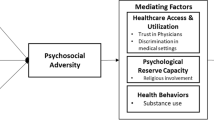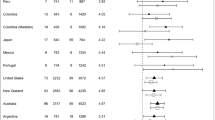Abstract
People living with HIV (PLHIV) have almost double the risk of depression than the rest of the population, and depression and anxiety among PLHIV have been linked with greater disease progression and other physical health problems. Studies to date, however, have focused almost exclusively on depression or general mental health. Much less research has investigated predictors of anxiety and generalized stress among HIV-positive gay men. This paper reports findings from a national community-based sample of 357 HIV-positive Australians gay men aged 18 years and older. Participants reported elevated rates of depression, anxiety, and generalized stress symptoms. A significant proportion of men with elevated depression and anxiety symptoms were not receiving treatment or had not been diagnosed. Risk factors for elevated mental health concerns included experiences of internalized stigma and discrimination. Anxiety was also associated with lower T-cell CD4 counts. A key protective factor was access to social support. The type of support, in particular emotional support, was found to be more important than the source of support. Our findings suggest that greater emphasis is needed on mental health screening and the provision of emotional support for PLHIV.

Similar content being viewed by others
References
Ciesla JA, Roberts JE. Meta-analysis of the relationship between HIV infection and risk for depressive disorders. Am J Psychiatry. 2001;158(5):725–30.
Lyons A, Pitts M, Grierson J. Exploring the psychological impact of HIV: health comparisons of older Australian HIV-positive and HIV-negative gay men. AIDS Behav. 2012;16(8):2340–9.
Miners A, Phillips A, Kreif N, et al. Health-related quality-of-life of people with HIV in the era of combination antiretroviral treatment: a cross-sectional comparison with the general population. Lancet HIV. 2014;1(1):e32–40.
Gonzalez JS, Batchelder AW, Psaros C, Safren SA. Depression and HIV/AIDS treatment nonadherence: a review and meta-analysis. J Acquir Immune Defic Syndr. 2011;58(2):181–7.
Cohen S, Janicki-Deverts D, Miller GE. Psychological stress and disease. JAMA. 2007;298(14):1685–7.
Cruess DG, Petitto JM, Leserman J, et al. Depression and HIV infection: impact on immune function and disease progression. CNS Spectr. 2003;8(1):52–8.
Hartzell JD, Janke IE, Weintrob AC. Impact of depression on HIV outcomes in the HAART era. J Antimicrob Chemother. 2008;62(2):246–55.
Leserman J. HIV disease progression: depression, stress, and possible mechanisms. Biol Psychiatry. 2003;54(3):295–306.
Bouhnik A-D, Préau M, Schiltz M-A, et al. Unsafe sex with casual partners and quality of life among HIV-infected gay men: evidence from a large representative sample of outpatients attending French hospitals (ANRS-EN12-VESPA). J Acquir Immune Defic Syndr. 2006;42(5):597–603.
Asch SM, Kilbourne AM, Gifford AL, et al. Underdiagnosis of depression in HIV: who are we missing? J Gen Intern Med. 2003;18(6):450–60.
Rodkjaer L, Laursen T, Balle N, Sodemann M. Depression in patients with HIV is under-diagnosed: a cross-sectional study in Denmark. HIV Med. 2010;11(1):46–53.
Pence BW, O’Donnell JK, Gaynes BN. Falling through the cracks: the gaps between depression prevalence, diagnosis, treatment, and response in HIV care. AIDS. 2012;26(5):656–8.
Mao L, Kidd MR, Rogers G, et al. Social factors associated with major depressive disorder in homosexually active, gay men attending general practices in urban Australia. Aust N Z J Public Health. 2009;33(1):83–6.
Rogers G, Curry M, Oddy J, Pratt N, Beilby J, Wilkinson D. Depressive disorders and unprotected casual anal sex among Australian homosexually active men in primary care. HIV Med. 2003;4(3):271–5.
Meyer IH. Prejudice, social stress, and mental health in lesbian, gay, and bisexual populations: conceptual issues and research evidence. Psychol Bull. 2003;129(5):674–97.
Earnshaw VA, Chaudoir SR. From conceptualizing to measuring HIV stigma: a review of HIV stigma mechanism measures. AIDS Behav. 2009;13(6):1160–77.
Logie C, Gadalla T. Meta-analysis of health and demographic correlates of stigma towards people living with HIV. AIDS Care. 2009;21(6):742–53.
Hall VP. The relationship between social support and health in gay men with HIV/AIDS: an integrative review. J Assoc Nurses AIDS Care. 1999;10(3):74–86.
Lam PK, Naar-King S, Wright K. Social support and disclosure as predictors of mental health in HIV-positive youth. AIDS Patient Care STDS. 2007;21(1):20–9.
McDowell TL, Serovich JM. The effect of perceived and actual social support on the mental health of HIV-positive persons. AIDS Care. 2007;19(10):1223–9.
Friedland J, Renwick R, McColl M. Coping and social support as determinants of quality of life in HIV/AIDS. AIDS Care. 1996;8(1):15–32.
Emlet CA, Fredriksen-Goldsen KI, Kim H-J. Risk and protective factors associated with health-related quality of life among older gay and bisexual men living with HIV disease. Gerontologist. 2013;53(6):963–72.
Lovibond SH, Lovibond PF. Manual for the Depression Anxiety Stress Scales. 2nd ed. Sydney: Psychological Foundation; 1995.
Henry JD, Crawford JR. The short-form version of the Depression Anxiety Stress Scales (DASS-21): construct validity and normative data in a large non-clinical sample. Br J Clin Psychol. 2005;44(2):227–39.
Clark LA, Watson D. Tripartite model of anxiety and depression: psychometric evidence and taxonomic implications. J Abnorm Psychol. 1991;100(3):316–36.
Kalichman SC, Simbayi LC, Cloete A, Mthembu PP, Mkhonta RN, Ginindza T. Measuring AIDS stigmas in people living with HIV/AIDS: the Internalized AIDS-Related Stigma Scale. AIDS Care. 2009;21(1):87–93.
Cohen S, Mermelstein R, Kamarck T, Hoberman HM. Measuring the functional components of social support. In: Sasason IG, Sarason B, editors. Social support: theory, research and applications. The Hague: Martinus Nijhoff; 1985. p. 73–94.
O’Brien RM. A caution regarding rules of thumb for variance inflation factors. Qual Quant. 2007;41(5):673–90.
Cohen J, Cohen P, West SG, Aiken LS. Applied multiple regression/correlation analysis for the behavioral sciences. 3rd ed. Mahwah, NJ: Lawrence Erlbaum Associates; 2003.
Tabachnick BG, Fidell LS. Using multivariate statistics. 5th ed. Boston: Pearson Education Inc.; 2007.
Slade T, Johnson A, Teesson M, et al. The mental health of Australians 2: report on the 2007 National Survey of Mental Health and Wellbeing. Canberra: Department of Health and Ageing; 2009.
Lyons A, Pitts M, Grierson JW, Thorpe R, Power J. Ageing with HIV: health and psychosocial well-being of older gay men. AIDS Care. 2010;22(10):1236–44.
Grierson JW, Pitts M, Koelmeyer R. HIV futures seven: The health and wellbeing of HIV positive people in Australia, monograph series 88. Melbourne: The Australian Research Centre in Sex, Health and Society, La Trobe University; 2013.
Joint United Nations Programme on HIV/AIDS. 90-90-90: an ambitious treatment target to help end the AIDS epidemic. Geneva: UNAIDS; 2014.
Degroote S, Vogelaers D, Vandijck DM. What determines health-related quality of life among people living with HIV: an updated review of the literature. Arch Public Health. 2014;72(1):40.
Hoffman MA. HIV disease and work: effect on the individual, workplace, and interpersonal contexts. J Vocat Behav. 1997;51(2):163–201.
Schrimshaw EW, Siegel K. Perceived barriers to social support from family and friends among older adults with HIV/AIDS. J Health Psychol. 2003;8(6):738–52.
Fryers T, Melzer D, Jenkins R. Social inequalities and the common mental disorders. Soc Psychiatry Psychiatr Epidemiol. 2003;38(5):229–37.
Weich S, Lewis G. Poverty, unemployment, and common mental disorders: population based cohort study. BMJ. 1998;317(7151):115–9.
Crawford J, Cayley C, Lovibond PF, Wilson PH, Hartley C. Percentile norms and accompanying interval estimates from an Australian general adult population sample for self-report mood scales (BAI, BDI, CRSD, CES-D, DASS, DASS-21, STAI-X, STAI-Y, SRDS, and SRAS). Aust Psychol. 2011;46(1):3–14.
Acknowledgments
This study was funded by the Australian Government Department of Health.
Author information
Authors and Affiliations
Corresponding author
Rights and permissions
About this article
Cite this article
Heywood, W., Lyons, A. HIV and Elevated Mental Health Problems: Diagnostic, Treatment, and Risk Patterns for Symptoms of Depression, Anxiety, and Stress in a National Community-Based Cohort of Gay Men Living with HIV. AIDS Behav 20, 1632–1645 (2016). https://doi.org/10.1007/s10461-016-1324-y
Published:
Issue Date:
DOI: https://doi.org/10.1007/s10461-016-1324-y




